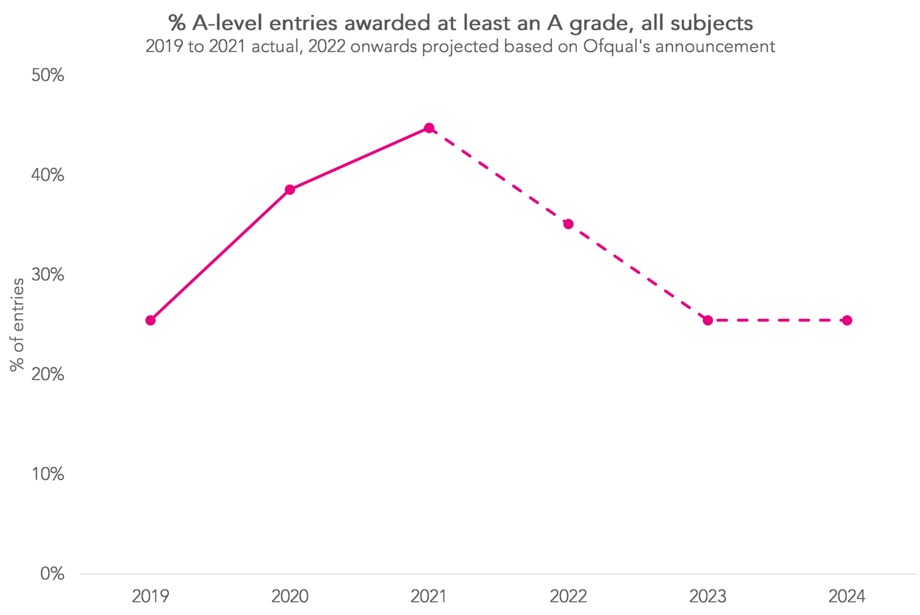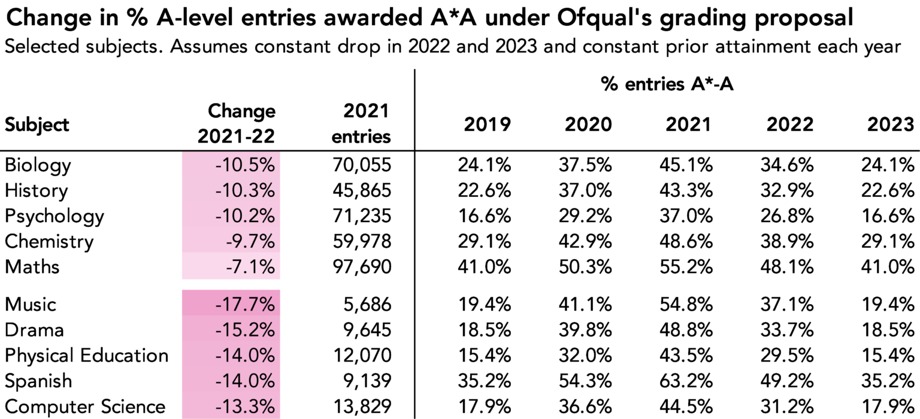What impact will Ofqual's chosen grading system in 2022 have?
Back
This piece was initially published on FFT Education Datalab's blog in September here by Katie Beynon.
If all goes to plan, 2022 will be the first year since 2019 to see GCSE and A-level grades awarded by external exams.
Today, Ofqual announced the approach they’ll take to grading. And they confirmed adaptations to make the exams fairer for kids who’ve missed lots of school (with more details to come in February).
They also announced a consultation on a back-up plan in the event that 2022’s exams need to be cancelled.
The chosen grading approach
Ofqual have decided to return to the pre-pandemic grade distribution over two cohorts. This means that 2022’s grades will be based on the average of 2019’s and 2021’s. And 2023’s grades will be similar to 2019’s.
The rationale behind this choice is that a return to pre-pandemic standards is needed, but doing so in 2022 would disadvantage those competing with 2021’s students (with much higher grades) for jobs and university places.
Let’s see whether the chosen approach achieves this aim.
Overall impact
The decision taken by Ofqual affects all grades awarded at both GCSE and A-level, but we’ll focus on the top grades at A-level here.[1]
Overall, the percentage of entries awarded at least an A grade was 25.5% in 2019, 38.6% in 2020 and 44.8% in 2021.

Ofqual’s choice, assuming a constant drop each year and no changes in the prior attainment distribution, would see 35.1% of 2022’s entries awarded at least an A. That’s around 10 percentage points lower than 2021’s, and 3 percentage points lower than 2020’s.
A yearly drop of 10 percentage points is big. But it could actually turn out to be bigger than that.
Following the award of CAGs for GCSEs in 2020, we expect more pupils will have opted to start A-levels. This should, in turn, lead to an increase in A-level entries. This would mean that the prior attainment profile of A-level entrants will be lower in 2022 than in previous years. We would expect to see more lower grades awarded as a result.
Impact by subject
So that’s what it could look like overall. But how about by subject?
Let’s look at the 5 subjects who saw the biggest increases in top grades between 2019 and 2021 and the 5 subjects with the most entries in 2021.

Naturally, subjects whose grades increased by the most between 2019 and 2021 have the steepest descent. Music and drama would see grades awarded at least an A decrease by around 18 and 15 percentage points, respectively, in 2022 (and again in 2023).
Bigger subjects like biology and history wouldn’t be hit as hard, but would still see substantial decreases of around 10 percentage points.
Again, these numbers are based on the assumptions of constant prior attainment. Subjects where prior attainment is lower than previous years will see bigger drops than we’ve shown here.
Summing up
The decision of how to grade exams in 2022 was never going to be easy. And none of the possible solutions were going to please everyone.
The choice that Ofqual have made will see big drops in grades for 2022 and 2023’s cohorts, particularly in subjects where grade increases over the pandemic were steepest.
How students and parents will respond to such big drops remains to be seen.
Katie Beynon is a statistician at the Datalab, a team of education data analysts using statistics to inform policymaking and school practices.

